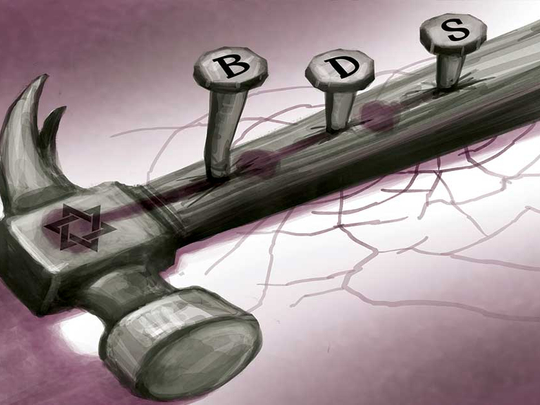
The Boycott, Divest and Sanctions (BDS) movement against Israel is in the news — again. Must be, because it’s successful, or because campaigns by the victimised to subtly punish their victimisers never fail to engage our imagination, our built-in human propensity to side with the underdog. Or perhaps those of us who abjure violence, even in a struggle for national liberation, view them as a form of non-violent protest that, in the end, will achieve more goals with less effort than resorting to an armed conflict. Moreover, boycotts almost always work.
Consider this. In 1880, when Ireland was still subject to Britain’s colonial tutelage, Charles Boycott, a British land agent in Mayo county, in the western part of the Emerald Isle, evicted non-paying tenants off the property of his boss, a fellow Briton, he found himself a social and economic pariah.
Boycott’s employees, including the seasonal workers required to harvest the crops, who had campaigned for, but were denied their right to the three F’s (fair rent, fixity of tenure and free sale) stopped working in the fields, in his stables and even in his house. And activists from the Irish Land League began a successful campaign of isolation against him, with local businesses refusing to take his money and postmen refusing to deliver his mail.
The unyielding Boycott, a former military man, would not budge and proceeded to employ scabs, mostly Orangemen from the nearby county Cavan, who needed well over one thousand soldiers from the Royal Irish Constabulary to protect them from the wrath of the locals. The episode cost the British government, and the landowner, one Lord Erne, roughly £10,000 (Dh54,447) to harvest about £500 worth of crops. The impoverished hired hands of County Mayo went on, in time, to win their rights and the reviled Boycott went on, in no time, to lend his name as a byword for economic ostracism to several languages — including English, French, German and Russian.
Boycotts, I say, work. They almost always work. They work effortlessly when their goals are responsive to the mass sentiment.
Consider the Indian boycott of British goods organised by Mahatma Gandhi around the second decade of the 20th century; and the 1955 Montgomery, Alabama, bus boycott — a campaign against the policy of racial segregation on the public mass transit system, that effectively kicked off the civil rights movement. Then consider the boycott campaign in 1959 that began, like BDS, as an international movement founded by African exiles in London, who did not ask its supporters for “anything special”, in the words of Julius Nyerere. “We are just asking you to withdraw your support for apartheid by not buying South African goods.”
Boycotts do indeed work. “In South Africa”, wrote Archbishop Desmond Tutu, “we could not have achieved our freedom and just peace without the help of people around the world who, through the use of non-violent means, such as boycotts and divestment, encouraged their governments and corporate actors, to reverse decades-long support for the apartheid regime.” And a measure of how effective BDS has been in its campaign is that two weeks ago, the Governor of New York, Andrew Cuomo, bypassing the state legislature, signed, just off the cuff, an executive order essentially creating a blacklist of entities that boycott Israel, banning these entities from receiving taxpayer funding.
Cuomo followed that up by writing an Op-Ed in the Washington Post on June 12 with a bullying title, ‘If you boycott Israel, New York will boycott you’. The piece, which appeared to threaten BDS supporters with pauperisation, was sinister to the extreme and, well, un-American, for a boycott is a form of free speech, a hallowed tradition in American political culture.
As Daniel Sieradski, founder of Progressive Jews Political Action Committee, wrote in his own Op-Ed in the New York Times the following day: “The movement to boycott, divest from and sanction Israel is a strategy intended to combat Israel’s nearly 50-year occupation of the Palestinian territories in the West Bank and Gaza, a situation that three former Israeli prime ministers, as well as [United States] Secretary of State John Kerry, have warned would become akin to apartheid if allowed to continue ...
“I also believe that economic boycott is a legitimate form of political expression, one that the government has no business restricting ... Paradoxically, Cuomo has engaged in a type of boycott himself, issuing three executive orders banning nonessential travel by state employees to Indiana, Mississippi and North Carolina for discriminatory laws against LGBT people. Apparently, in Mr Cuomo’s book, boycotts are acceptable against American states with discriminatory laws, but not against a foreign government that has systematically subjected millions of people to decades of oppression.”
Beyond the hypocrisy inherent in it, Cuomo’s executive order makes it clear that what his government wants to punish is political in nature, and no state government, as several rulings by the Supreme Court would attest, can penalise people or entities on the basis of their free expression. Clearly, political boycotts are a form of free expression.
If you think Cuomo’s action is extremist (and most probably of dubious legal standing as well), then consider one Israeli leader’s response to BDS. In March this year, the Israeli Intelligence and Atomic Energy Minister, Yisrael Katz, argued that Israel should employ “targeted civil eliminations” against leaders of the movement, which of course is shorthand for “targeted assassinations”. The venom of anti-BDS rhetoric has a “tell”. The more poisonous it is, the more it betrays the fact that the movement’s activists are doing their job well. They must be doing something right.
All the power to you, guys. Just watch your back and grow a tougher hide.
Fawaz Turki is a journalist, lecturer and author based in Washington. He is the author of The Disinherited: Journal of a Palestinian Exile.









